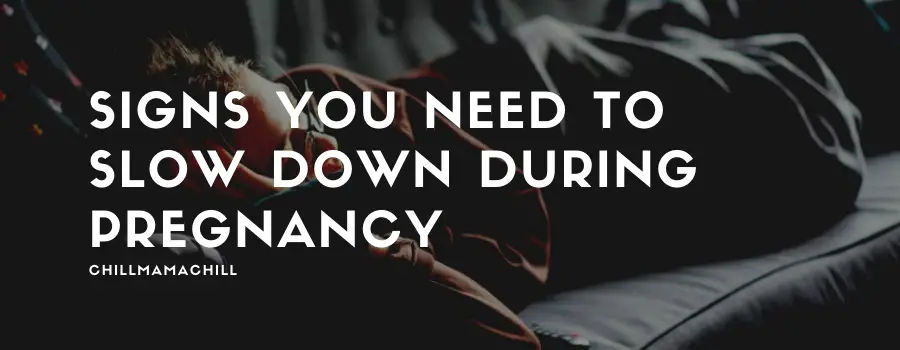Despite the myriad ‘informaticles’ you’ll come across dealing with symptoms while pregnant, you’re still left wondering if what you’re feeling is normal or not. Sometimes, the red flags will be staring at you right in the face, regardless of the trimester you’re at. But what are the signs you need to slow down during pregnancy?
It’s typical of pregnancy to force a lowering of your activity standards, tweak some changes and slow you down a little. While being pregnant doesn’t bring the rest of your life to a standstill, some signs warrant your attention. By listening to your body and interpreting symptoms, your unborn baby’s safety will take precedence.
Not every pregnancy sign is an alarm that you need to slow down. Some, however, require swift medical attention as you risk endangering or even losing your baby. Here I list some of the symptoms of over-exertion that you shouldn’t ignore when pregnant.
Signs That Your Pregnancy Is in Danger If You Don’t Slow Down
Some women sail through pregnancy, easy as cheese, only contending with symptoms termed ‘normal.’ Others, however, have it rough physically and mentally. As your fetus grows, your body changes in many ways, and complication can occur in a heartbeat. You must interpret signs you need to slow down and convey how you feel to your doctor immediately.

To decide whether to continue working, exercising, or doing certain household chores, consider signs like;
Extreme Nausea and Vomiting
While a typical but annoying symptom of pregnancy, morning sickness in itself should worry you too much. But when you can’t stop throwing up or food doesn’t stay down, it’s time to let your doctor know. That’s especially dangerous when loss of fluid leads to dehydration, which endangers your unborn baby.
One diagnosis is yours could be hyperemesis gravidarum, a severe form of morning sickness that could endure throughout your pregnancy. Another more sinister reason is food poisoning, especially if a fever accompanies the vomiting. You’ll need to visit the hospital in such a case so they can administer intravenous hydration and antibiotics.
Excessive Bleeding
While the first trimester is marked by some light spotting, excessive bleeding, and the nature of the discharge show you need to slow down. Any early pregnancy spots indicate the planting of the egg on your uterine walls, but a heavy blood flow can point to a miscarriage. That’s especially worrisome in the second and third trimesters, as that could mean your uterus is ruptured.
Early labor is preceded by the loss of the mucus plug, which seals the cervix and flows similar to blood. Cervical polyps, although benign, may also be to blame, or intercourse if your tissues are tender. If you notice bleeding that’s excessive, it’s best to contact your doctor immediately.
Strong Headaches
An occasional headache during pregnancy is nothing to worry about, seeing as it’s caused by increased blood and hormones in your body. It’s a danger sign, however, if your headaches persistently, and it’s accompanied by dizziness, blurred vision, or fainting. Drink some water as it could be a sign of dehydration, find a place to sit if you’re feeling faint, or try lying down on your left side.
It would help if you got someone to stay with you as you speak to the doctor. Severe headaches could point to preeclampsia, a condition caused by maternal high blood pressure. Other symptoms include swelling of the hands, face, feet, abdominal pain, blurred vision, flu-like runny nose, or itchy throat.
You’re especially vulnerable to preeclampsia if you’ve gained weight rapidly, there’s a history of hypertension in your family, preexisting diabetes, or you’re carrying multiples.
Abdominal Pain
Doubling over with cramps at less than 12 weeks will have your doctor wanting to rule out an ectopic pregnancy.

That’s where the zygote implants inside the fallopian tube instead of the uterus. There’s a concern if, by that time, you hadn’t scheduled an ultrasound scan.
Stomach pains in the second or third trimesters are regular, except if they’re getting worse. Sometimes it’s a sign of your uterus growth, stretching of ligaments, or intestinal gas. Pain in your belly can also indicate early contractions or something as unrelated as appendicitis.
Fever or Chills
The healthy growth of your unborn bundle relies on your body’s maintenance of a temperature of around 103° Fahrenheit. Running a fever early in your pregnancy proves a hazard as it disrupts normal womb functions, resulting in miscarriage. Later on, higher temperatures could signal an infection or something else that your doctor will investigate.
Discharge
Gushes of watery discharge nearing your baby’s birth indicate that your water has broken. But getting excessive flow before your 37th week will need you to call your doctor as soon as possible. It could mean that your amniotic sac has ruptured, which means you’ll be going into preterm labor.
However, less than significant discharge during the second or third trimester shouldn’t worry you too much. It might even be that your baby’s movements, such as kicks, are upsetting your bladder, leading to slight urine leaks.
Pain down Your Leg
You are six times at a greater risk of developing blood clots when pregnant, causing deep vein thrombosis or DVT. That can result from changes in your hormonal levels, impeded by the pressure your growing uterus places on your pelvic veins. Pain in your leg is distinguishable from the typical pregnancy cramps, especially when compounded in one area, which feels hot.
Sometimes, however, DVT can be stealthy, showing symptoms when a blood clot has traveled to your lung. Chest pain, a rapid heart rate, or shortness of breath are red flags that should have you slowing down and calling your doctor. Clotting risk is higher in older mums-to-be, overweight, or genetically predisposed people.
Conclusion
Later in the third trimester, you’ll begin to feel your baby’s movements, also called fetal kicks. If you can’t feel your unborn tot moving, it means you may have low amniotic fluid or oligohydramnios. Secure and prolong your pregnancy by listening to your body. Feeling this or any of the signs I’ve mentioned above is a cause for concern.

I’m Cathrine and I’m a 39-year-old mother of 3 from Utica, New York. And I’m extremely happy you’ve come to visit my hide-out on the web. Here I post about everything related to family-life and usually it will involve babies and lessons I’ve learned over the years from experts, friends, and my own mistakes. So hopefully you will find what i write fun and informational!

